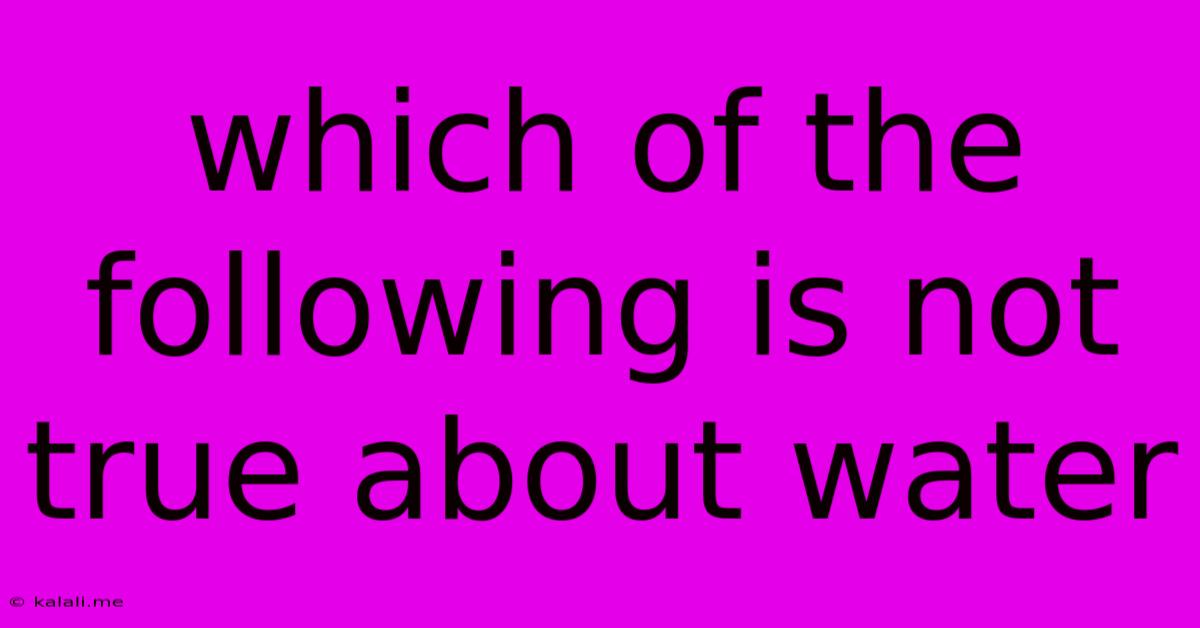Which Of The Following Is Not True About Water
Kalali
Jun 13, 2025 · 3 min read

Table of Contents
Which of the Following is NOT True About Water? Debunking Common Misconceptions
Water. We drink it, bathe in it, and it covers most of our planet. It seems simple, but this essential substance holds many fascinating properties, and some common misconceptions surround it. This article will explore several statements about water and identify the one that's inaccurate, delving into the scientific truth behind each. Understanding the true nature of water is crucial, whether you're a student studying chemistry or simply curious about the world around you.
Understanding Water's Unique Properties: Water's unique properties stem from its molecular structure – two hydrogen atoms covalently bonded to a single oxygen atom (H₂O). This seemingly simple structure gives rise to several remarkable characteristics, including its high specific heat capacity, its excellent solvent properties, and its unusual density behavior as it freezes.
Common Statements About Water: Fact or Fiction?
Let's examine some common statements about water and determine their accuracy:
-
Statement 1: Water is a universal solvent. This statement is largely true. Water's polarity, meaning it has a slightly positive and slightly negative end, allows it to dissolve a wide variety of substances, including ionic compounds and polar molecules. However, it's crucial to remember that it's not a perfect universal solvent; some substances, like oils and fats (nonpolar), are insoluble in water. Therefore, while incredibly versatile, the term "universal" is slightly exaggerated.
-
Statement 2: Water is denser as a solid than as a liquid. This is false. Unlike most substances, water is less dense as a solid (ice) than as a liquid. This unusual property is due to the hydrogen bonding in water molecules. When water freezes, the molecules arrange themselves into a crystalline structure with more space between them, resulting in lower density. This is why ice floats on water.
-
Statement 3: Water has a high specific heat capacity. This is true. Water's high specific heat capacity means it can absorb a significant amount of heat energy without a large temperature change. This property is crucial for regulating Earth's temperature and maintaining stable aquatic environments. It also explains why coastal regions have milder climates than inland areas.
-
Statement 4: Pure water is always a perfect conductor of electricity. This is false. Pure water is actually a poor conductor of electricity. It's the presence of dissolved ions, such as salts and minerals, that significantly increases its conductivity. Distilled water, for example, with minimal dissolved ions, conducts electricity poorly.
-
Statement 5: Water molecules are constantly moving. This is true. Water molecules are in constant motion, even at low temperatures. The kinetic energy of these molecules increases with temperature, leading to increased movement and higher fluidity. This constant motion plays a crucial role in many of water's properties and biological processes.
The Answer: Which Statement is NOT True?
Based on our analysis, the statement that is NOT true about water is Statement 2: Water is denser as a solid than as a liquid. Ice is less dense than liquid water, a critical property for life on Earth.
Understanding the nuances of water's properties, from its solvent capabilities to its density anomaly, provides valuable insight into its crucial role in various scientific fields and our daily lives. Challenging common assumptions and exploring the underlying science helps foster a deeper appreciation for this remarkable substance.
Latest Posts
Latest Posts
-
Is A Touchscreen An Input Or Output Device
Jun 14, 2025
-
Which Word Is An Antonym Of Abominable
Jun 14, 2025
-
Each Of Three Equal Capacitors In Series Has
Jun 14, 2025
-
Least Common Multiple Of 40 And 15
Jun 14, 2025
-
Brittle Vs Ductile Stress Strain Curve
Jun 14, 2025
Related Post
Thank you for visiting our website which covers about Which Of The Following Is Not True About Water . We hope the information provided has been useful to you. Feel free to contact us if you have any questions or need further assistance. See you next time and don't miss to bookmark.